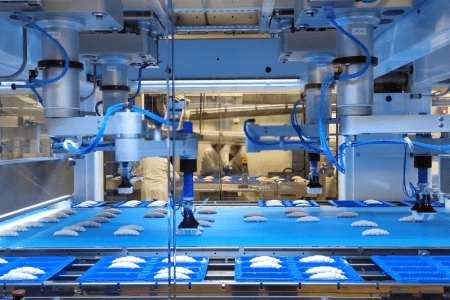The application of flour to baking shows there is no one size fits all approach, and stringent quality and quality control is hugely important. Editor Caitlin Gittins investigates
The flour sector continues to face challenges in soaring costs, supply chain disruption and extreme weather patterns linked to climate change. As a key component in baked goods and in feeding nations, the importance of ensuring a steady supply of flour to bakers continues to be hugely important. We can see innovative approaches in this sector span from fortifying conventional white flour to feed a public that continues to prefer this form of flour, to leveraging enzyme systems to replace functional properties of flour and mitigate costs, both in response to these challenges and in reflection of a sector that continues to support flour.
Feeding the nation
Flour feeds the nation. Whatever application – bread, cakes, pizzas, pastries – the consensus is clear: ensuring a steady supply of quality flour to bakers worldwide is part of the challenge, as the sector battles disrupted supply chains and sharp prices. Climate change as a challenge is frequently recurring in conversations, as challenging weather patterns like drought or heavy rains can impact on flour. “We already see these impacts on yield and protein content in the UK and around the world,” explained Ariane Derimay, Environment and Sustainability Manager at UK Flour Millers. “Yield and protein content are crucial to the availability of milling wheat that meet quality specifications and functionality requirements of the finished product.
“That is why it is important to work on wheat resilience and adaptation while mitigating the impact on the environment. It can be done through breeding, research, and innovation to develop wheat varieties that are adaptable to extreme weather while keeping carbon emissions in mind.”
“The 2020 UK wheat harvest epitomises the impact of extreme weather shifts throughout the growing season for crop production. The combination of torrential autumn rain, a dry spring, and downpours in summer impacted crop sowing, plant growth, and harvesting conditions, respectively,” said a Supplant Company spokesperson. “This resulted in some of the UK’s poorest wheat yields for decades.”
The Supplant Company has been actively involved in combating impacts felt by climate change to the flour sector – by upcycling food waste. Agricultural side streams including “corn corbs, oat hulls and wheat stalks make more sustainable replacements for some of the world’s most pervasive ingredients such as sugar and refined starch,” the spokesperson added.
Upcycling wheat stalks into flour has helped with increasing the fibre content and promoting sustainability in wheat growing. “Recently, there has been a shift in consumer habits to add nutrients – like fibre – back into their diets. Demand is largely driven by enhanced awareness of nutrition and gut health,” they said. “Many studies suggest that most Brits are not eating enough fibre, however, it’s an essential macronutrient for a healthy diet.”
Of course, flour always comes back to quality. Much as climate change related weather patterns are impacting on the yield and protein content, bakers need quality flour to sustain the nation. “Approximately 85% of the wheat we use in the UK is homegrown,” said Alistair Gale, Chief Executive of the UK Flour Millers. “This self-sufficiency…
This feature is from our upcoming January/February issue. Read our magazine here.
Never miss a story… Follow us on:
![]() International Bakery
International Bakery
![]() @int_bakery
@int_bakery
![]() @Bakeryint
@Bakeryint
Media contact
Caitlin Gittins
Editor, International Bakery
Tel: +44 (0) 1622 823 920
Email: editor@in-bakery.com






